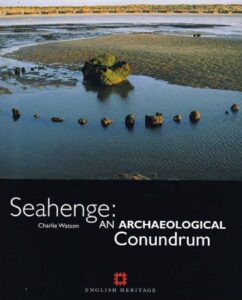 Seahenge: An Archaeological Conundrum, Charlie Watson
Seahenge: An Archaeological Conundrum, Charlie Watson
A short and beautifully illustrated book on Seahenge, mostly focusing on the practical issues of how it was made, how it was found, how it was excavated, and the hard facts discovered since from analysis of it. There’s less concentration on the speculations about a ritual landscape in the area, etc, than you find in Pryor’s book on the same site, and a lot more illustrations and photographs. The two complement each other, I think, though I am reading them quite far apart — this is much more ‘just the facts, sir’ than Pryor’s book, while Pryor did the work of interpretation.
If you’re just looking for some background on Seahenge, you’re definitely safe with this one!

I somehow had missed all news about Seahenge’s existence. Thank you for letting me know about it. I am somewhat conflicted by the controversy concerning its conservation. It seems sad that it was removed from the original site and yet at the same time exposure to the elements would have eventually destroyed it. Thoughts?
x The Captain
The Captain recently posted…Off the Charts – the immortalists (Chloe Benjamin)
I’ve always been torn about it as well. I feel that the people who built it knew that wood was perishable, and thus it was probably intended to decay. That may even have been the whole purpose. I’m usually reluctant to move/rebuild/change long-dead people’s spiritual/religious monuments, especially when it thus becomes a tourist attraction, although I do think we’re a bit prone to dubbing anything we don’t understand spiritual/religious!
On the other hand, there was a lot of knowledge about history to be learned from the site, and I do place some importance on that as well. I’m more inclined to feel we should have sampled it, dug exploratory trenches, and then let it be, on balance.
Aye, yer idea seems better on balance. I don’t like when we destroy things in the name of preservation. I always thought it was weird when I was a kid, for example, that scientists would find a new species and immediately kill and collect it. What if that frog was one of the last ones? Though with changes in technology and imaging, I do wonder what future archaeology will be like. And I find the ideas that anything unknown = spiritual/religious to be a bit ridiculous. I just read a very interesting article about trepanning in Russia where it had to be religious because the researchers couldn’t come up with another reason. I thought that was short-sighted. If only there were time machines . . .